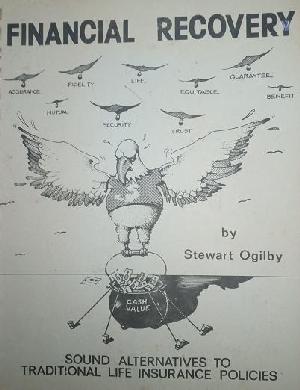|
After reading Consumer Reports magazine's shocking 1973 booklet about life-insurance I created Unified Financial Services in Worthington, Ohio. Within three years my personal sales volume, combined with that of thirty agents, hired and trained by me, qualified my business for Managing General Agency (MGA) commission contracts (commission level awarded today to FMO/IMO businesses). Having struggled to program Texas Instruments' TI-59 and its attached thermal printer, I set up Unified Data Systems to market a point-of-sale method of illustrating the huge financial benefit of funding separately one's life-insurance and family savings.
I wrote Financial Recovery primarily to help train my own agents. The book was marketed in early 1981 by means of a FULL-PAGE AD and accurate reviews in "Life Insurance Selling" Magazine. Having been read nationally by enlightened agents, and containing an original bibliography of fifteen references, the book was instrumental in having life-insurance companies heavily promote their latest variety of "investment", cash-value Universal Life Insurance.
Universal Life Insurance has turned out to be even more problematic than Whole Life Insurance and other cash value life insurance policies. See items #93, #94, #95, #96, and #97 within the updated bibliography of Financial Recovery.
After reading my book, George Diachok, CEO of Denver's Multi-Financial Corp., phoned me and set an appointment with me for dinner at the Holiday Inn restaurant adjacent to the Port Columbus, Ohio airport. Our meeting began a five-year friendship and working relationship with that exceptional man and his business partner, Gordon Eddolls, my company's financial broker and mentors (men who, years earlier, had introduced the marketing of mutual funds to the American public), memories of which I treasure.
Salesmen target anyone to whom they can pitch CASH VALUE "insurance", especially young working families of American minorities along with gullible professionals and seniors, including retirees. Companies structure commissions that pay salesmen handsomely for selling "policies" that produce huge company profits and human nature prevails.
Referring an owner of Universal Life Insurance to this online book's last five references pertaining to Universal Life Insurance, along with nearly ONE HUNDRED written references to the life-insurance industry, may encourage them to SELL or REPLACE any cash-value contract, including Universal Life-Insurance. This presents a huge opportunity for agents who handle term life-insurance, annuities, and life settlements and are anxious to assist their neighbors and trusting customers.
For a working family in the USA to obtain ADEQUATE and AFFORDABLE financial protection in the event of an income provider dying unexpectedly has been a NATIONAL DISGRACE for over a hundred years. The industry created to provide the logical solution to that scenario defaulted years ago in favor of directing limited family funds into their own coffers.
The time is NOW for a unique life-insurance company or a huge FMO to market competitively priced term life-insurance nationally, promoting a team of branded Wisebird agents AGAIN REPOSITIONING TRILLIONS OF DOLLARS IN OVERCHARGES that have been pitched as investments over the past forty years by agents selling varieties of CASH VALUE life "insurance".
Any agency may share this URL with their downline: WISEBIRD.COM
Continue reading for the billion-dollar proprietary marketing opportunity
 
DO THE RIGHT THING AND REAP THE JUST REWARDS
While working in New York City with national consumer products marketing campaigns, I learned years ago that
BRANDING IS ESSENTIAL FOR CREATIVE MARKETING. Brand your website(s), products, services, and sales-persons to be IDENTIFIED AND REMEMBERED. A TOP LEVEL DOMAIN NAME LINKED TO YOUR OWN LOGO IS MARKETING DYNAMITE. CREATE YOUR UNIQUE BRAND. The price of WISEBIRD.COM is $15K. The price of WISEBIRDFINANCIAL.COM is $20K. That is valuable business property, not an unrecoverable cost.
During the 1980's, by means of utilizing a closed circuit TV system together with national marketing, A CREATIVE ENTREPRENEUR became a BILLIONAIRE, licensing and training agents to do the right thing financially for their own neighbors. You MUST WATCH his video: CLICK HERE TO WATCH THE VIDEO
Today's INTERNET is a hugely viable alternative to closed circuit TV.
A.L. Williams' huge financial success in exposing the world's weathiest industry nationally was not jeopardized by the popularity of Financial Recovery. That remarkable Organization was headed by Art Williams. He had worked with and been trained by George Diachok at Waddell and Reed. The A.L. Williams Organization needed neither my book nor the printed copies of its Appendix #1, to be outstandingly successful.
When Art's business partner, Bob Turley (N.Y. Yankees' fast-ball pitcher), phoned me offering a V.P position, I declined but thanked him profusely. With three teen-agers and a younger child at home (my partner's three children and my own teen-age son), along with training agents and managing my business, I had no desire to merge my own successful business or to get licensed in other states.
Returning to my nearby office every evening after family dinner, I wrote point-of-sale programs for the TI-59 programmable calculator using term life insurance rates of several life insurance companies. I mailed programmed magnetic cards to the agents around the country who had contacted me after reading Financial Recovery, in which point-of-sale annual calculations for replacing a cash-value life insurance policy were printed. Now outdated by computer technology, that TI-59 system is not included in this 2025 online edition of my book. It can be duplicated today online, driving a final nail into the coffin of exposed cash value life "insurance".
Universal Life Insurance consists of annually renewable term life-insurance (the cost of which skyrockets as one grows older) combined with flexible overcharges that create CASH VALUE, enabling salespersons, trained by the companies, to pitch life-insurance as an investment (as usual). If owned today, I might suggest, based on individual circumstances, that it be either sold for value (if possible) and/or replaced, with professional oversight, by a Wisebird Agent. For the reasons, see items #93, #94, #95, #96, and #97 within the book's updated bibliography
To understand why I dedicated Financial Recovery to the late Senator Philip Hart of Michigan, please read completely the book's Introduction
Payments ("premiums") overcharges that build "cash value" were formerly fixed amounts in traditional "endowment" contracts (whole life insurance and others). Those overcharges were shrewdly changed from fixed to variable, rendering any desired cost disclosure of the UL product, in general, virtually impossible
Over the years many consumer-oriented writers have done what they considered publicly important. See the book's new online Bibliography
A little history:
Life insurance companies were required by law to provide customers who lapse or discontinue a cash-value policy with either converting to a low cost term policy or receiving back a portion of the overcharges that they pay for in a cash-value policy. Prior to these laws the companies kept the entire overcharges.
You may be familiar with the saying, When given a lemon, make lemonade. That is what the companies do. They meet their legal requirement by placing a Table of cash and non-forfeiture values in the pages of cash-value policies. They then cleverly train salesmen to pitch that LEGAL REQUIREMENT as their own brilliant creation, a so-called foolproof way for trusting customers to "invest" money, especially in planning for a secure retirement.
Following the publication of Financial Recovery, I hired and trained over thirty agents in Ohio, appropriately replacing cash value policies with a variety of term insurance (that I think is no longer available) for family financial protection. We usually set up IRA's with recovered cash values and the premium difference. Then I retired to Florida.
 A fortune will be made by BRANDING autos with "WiseBird.com" bumper stickers along with agents wearing a "WiseBird" cap (or visor) and shirt (or sweater) during face-to-face and remote presentations. Wisebird branding items can be given to contracted agents, accompanying initial commission(s).
A fortune will be made by BRANDING autos with "WiseBird.com" bumper stickers along with agents wearing a "WiseBird" cap (or visor) and shirt (or sweater) during face-to-face and remote presentations. Wisebird branding items can be given to contracted agents, accompanying initial commission(s).
FOR ONLINE MARKETING & PROPRIETARY BRANDING PROTECTION
The below twelve registered internet domain names --
AVAILABLE TO AN EXISTING NATIONAL TERM LIFE-INSURANCE MARKETING BUSINESS.
Wisebird.com
FinancialRecoveryBook.com
WisebirdFinancial.com
WisebirdAgent.com
WisebirdAgents.com
MyWisebirdAgent.com
WisebirdRecovery.com
WisebirdPartners.com
WisebirdInsurance.com
WisebirdAnnuities.com
WisebirdInvestments.com
LifeInsuranceBooks.com
Today's social media make this consumer friendly business a "no brainer" for creative marketing
together with exclusive use and editing of related internet domains. When I have been able to
find a couple of ambitious partners we will repeat essentially the same business model that
made me enough money to retire in Florida as well as made many millions of dollars for others
following the release of my book. If you are interested call (941) 545-3600.
Included here online are the Introduction to Financial Recovery together with several of the book's original chapters.
The information herein is not intended to replace technical information on products offered by individual companies. Neither does this book attempt a throrough treatment of the deficiencies of the whole life and "legal reserve" (cash value) life insurance concepts, which have been documented elsewhere.*
This book provides the Author's opinion in regard to the subject matter covered. It is written and sold with the understanding that the Publisher and Author are not engaged in rendering legal, accounting or other professional service. If legal advice or other expert assistance is required, the services of a competent professional person should be sought.
State regulations regarding terminology acceptable in sales presentations vary, as do recently enacted life insurance "replacement regulations". Agents and brokers must adhere to their own regulations. The fact that industry-sponsored "replacement regulations" are clearly not in the public interest and patently designed to protect the companies against the loss of their cash value accounts must not dissuade the honest agent from exercising his responsibility to his license, to his client, and to himself.
The Author specifically disclaims any personal liability, loss, or risk incurred as a consequence of the use and application, either directly or indirectly, of any advice or information presented herein. Insurance agents should check with their own insurers to become knowledgeable about their individual MPWL policy provisions.
NOTE TO THIS COPY PLACED ONLINE IN 2025 OF THE WIDELY-READ 1980 BOOK, FINANCIAL RECOVERY:
The U.S. life insurance industry is regulated at the state levels by its "commissioners". The product referred to herein was submitted at state-wide levels for sales approval. It was cleverly termed "Modified Premium Whole Life Insurance" and, as a "whole life" product, it was made available to the public. Soon referred to more accurately as "deposit term insurance", and a viable means for enlightened agents to replace problematical "whole-life" policies for reasons presented in FINANCIAL RECOVERY. As such, it became soundly deprecated by industry sources and by misguided licensed agents. To the author's best knowledge, the MPWL product is no longer made available by the U.S. life insurance industry. For a clearer understanding, when reading these pages, replace "MPWL" with "Term Life Insurance".
FINANCIAL RECOVERY — Introduction
AN ASIDE (ON BEHALF OF A GOOD MAN)
The following tribute to the late Philip A. Hart, United States Senator from Michigan, should be unnecessary. Unfortunately, due to the 1973 hearings on the life insurance industry in the U.S. Senate's Subcommittee on Antitrust and Monopoly, of which he was chairman, it has become fashionable, in life insurance circles, to hear Philip Hart referred to contemptuously. Understanding, as we do, that the agents who fall prey to this sort of mass psychology do so from ignorance, we feel compelled to recall some facts about this man.
Philip Hart graduated from West Philadelphia Catholic High School and went to Georgetown University. At Georgetown University he was president of the student body and he graduated cum laude. He went on to law school at the University of Michigan and received his J.D. degree. When World WarII began he was commissioned a second lieutenant in the United States Army. During the D-Day invasion of Normandy on June 4, 1944, he was wounded. He rejoined his division in December and was discharged in 1946 with the rank of lieutenant colonel. He was decorated with the Bronze Star with clusters, Invasion Arrowhead, Purple Heart and the French Croix de Guerre.
He helped to lead the legislative battles to end bigotry and he was in the forefront of the fight to aid consumers. He grew a beard, the only one in the Senate in his time, at the request of his six children as a token of solidarity with the youth of America. Upon leaving the Senate in 1976 Philip Hart said that during the years he spent in the Senate, "We . . . spent for our "security" God knows how many hundreds of billions of dollars ... Would we be less secure if we had spent ten percent of it on food and medical schools and other social needs?"
He missed, due to hospitalization for cancer treatments, the early sessions of the Senate Select Committee on Intelligence hearings which detailed the abuses of the FBI and the CIA. However, when he made his first appearance and heard testimony about the FBI's actions against Martin Luther King and against others who had been openly critical of official policies, he moved most of his colleagues and his audience deeply with a monologue stating that his children had been right in the 1960's to claim, over his protests, that the government was trampling the rights of citizens.
Throughout his 18 years in the Senate, Philip Hart was not a fiery orator or a seeker of sensational headlines. Yet it was a measure of the esteem in which the gentle, slightly built man was held by his colleagues that in August 1976, the Senate named its new Senate Building under construction near the Capitol, the Philip A. Hart Office Building.
The Senate majority leader, Mike Mansfield of Montana was asked on his last day in the Senate who had been the most outstanding Senator he had met. Without a pause, Mr. Mansfield replied: "Philip Hart. He is a man of great courage, great compassion, great determination. Don't be fooled by the exterior. He's a man of steel. He's a man who is modest, a real back-bencher."
"In debate his voice almost never shook the rafters here", said Senator Edward Kennedy of Massachusetts. "He preferred to use his words to shake our conscience and our votes. He never had an axe to grind, but he always cut through every issue to find the truth and open it up for all of us to see."
President-elect Jimmy Carter praised Senator Hart as "a man of unquestionable integrity. He exemplified the highest of moral and ethical standards in public service. He was a friend of the American consumer and a tireless worker against injustice."
In 1973, as we have mentioned, the U.S. Senate subcommittee on Antitrust and Monopoly heard testimony on the insurance industry. The total oral testimony and "Material Submitted for the Record" covers three volumes and 2,216 pages. It is difficult to find words suitable or strong enough to describe the shocking and disgraceful disclosures recorded by this committee of the greed, irresponsibility, and betrayal of the public trust by the life insurance industry.
Philip A. Hart died at his home in Washington of cancer on December 26, 1978 at the age of 64. He was buried on Michigan's Mackinac Island. He never lived to see reforms forthcoming by the life insurance companies or the legislative remedies enacted which he believed to be necessary.
We may not share Senator Hart's optimism with regard to the likelihood of government functioning in a moral role. Such optimism is clearly shattered by witnessing the stampede of governmental regulatory bodies, the separate state insurance departments, to enact the "NAIC Model Life Insurance Replacement Regualations." However, if this brief book can claim any inspiration and dedication it is to Senator Philip A. Hart. Certainly, anyone aware of these facts will be less inclined to join in deriding the name of a good man who cared deeply about his fellow human beings and about the quality of our lives.
THE SOLUTION: Buy only TERM LIFE-INSURANCE.
* Five criteria to apply to every proposed investment:
#1 First, and PRIMARY is SAFETY
#2 is YIELD (interest or earnings growth)
#3 is FLEXIBILITY (Can I make periodic deposits/withdrawals of various amounts without incurring serious charges?)
#4 is LIQUIDITY (Can I withdraw all or a portion at will? - real-estate is a good example - it may be an excellent investment but it is not liquid because, in general, 100% must be liquidated to access any portion
#5 is TAX CONSEQUENCES (Does my account grow in a tax-deferred environment and does it affect my over-all tax liability?)
There is probably a big difference between a term-insurance premium and what you are paying for a cash-value life-insurance policy. Why lose control of that money? Do you really believe that any corporation today considers your interests before that of its managers and stock-holders?
* Selected Quotations (Appendix 1)
|




